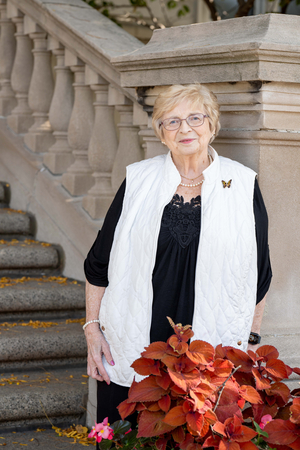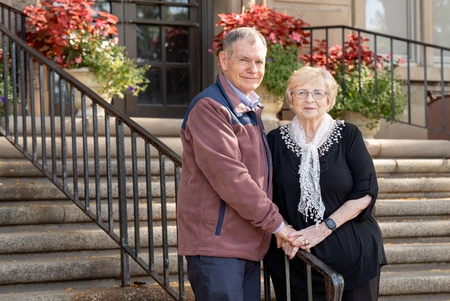A Miracle Treatment
Shortness of breath. Chronic exhaustion. The inability to lead a normal, healthy life.
 This is the daily struggle faced by millions of Americans with severe heart issues—and one Kay Veitengruber knew all too well.
This is the daily struggle faced by millions of Americans with severe heart issues—and one Kay Veitengruber knew all too well.
An 80-year-old resident of Frankenmuth, Michigan, Kay’s health took a turn for the worse nearly 20 years ago when she started experiencing irregular heartbeats, breathing issues and extreme fatigue.
“I was working at Bronner’s Christmas Wonderland, and it was a struggle to do my job without feeling tired,” Kay says. “It affected everything outside of work, too.”
Her local family doctor referred her to a cardiologist in the Saginaw area, where she was diagnosed with atrial fibrillation (AFib), a condition that affects the heart’s ability to beat normally. If left untreated, AFib can increase the risk for heart failure, stroke and other related cardiovascular conditions.
This was a shock for Kay, who up until this point did not have any major health issues or a strong family history of heart issues.
Things get worse
Kay’s cardiovascular issues got worse over the years, and she developed some leakage in her heart’s mitral valve and congestive heart failure. She underwent numerous heart procedures, including two ablations, a mitral valve clip, three implanted pacemakers and a WATCHMAN procedure, also known as a left atrial appendage closure (LAAC).
“I had almost everything done that could be done and I was on medications, but I wasn’t seeing much improvement,” Kay says. “It’s a hard thing to not feel good all the time.”
She was also in and out of the hospital for testing, and after each of her procedures she had to stay in the hospital—for 18 days at one point.
“I knew I needed to try something else,” Kay says.
The right referral … and a groundbreaking clinical trial
 Given her cardiovascular history, Kay had an annual echocardiogram every year with her local cardiologist. But in 2023, the results showed something new: tricuspid regurgitation. This is a condition that results when the tricuspid valve that’s located between the two right heart chambers doesn’t close completely, causing blood to flow backward into the top right chamber (atrium). Tricuspid regurgitation often doesn’t show symptoms until the condition has advanced.
Given her cardiovascular history, Kay had an annual echocardiogram every year with her local cardiologist. But in 2023, the results showed something new: tricuspid regurgitation. This is a condition that results when the tricuspid valve that’s located between the two right heart chambers doesn’t close completely, causing blood to flow backward into the top right chamber (atrium). Tricuspid regurgitation often doesn’t show symptoms until the condition has advanced.
Kay was referred to the Henry Ford Center for Structural Heart Disease for further evaluation and traveled to Henry Ford Hospital in Detroit. During her first meeting, she saw William O’Neill, M.D., Henry Ford Health interventional cardiologist, and he scheduled another test, a transesophageal echocardiogram (TEE). This advanced diagnostic test uses ultrasound to produce high-quality images of the heart’s valves and chambers.
Dr. O’Neill also told Kay about a new clinical trial that he thought might be a good fit for her. The device being studied in the trial was an artificial tricuspid heart valve device designed to treat severe tricuspid regurgitation. This new device, the Edwards EVOQUE Tricuspid Valve Replacement system, would be implanted through a transcatheter procedure, a less-invasive procedure that delivers the valve to the heart through a blood vessel in the leg.
“We were part of the research team that tested the valve in clinical trials and have been testing different ways of treating the tricuspid valve for seven years,” Dr. O’Neill says. “So it was wonderful to be able to offer a new treatment for this disabling condition.”
Before this new device and procedure, open-heart surgery was the only procedure option for tricuspid regurgitation.
“Even though Dr. O’Neill thought this new device would be right for me, he still had me meet with a Henry Ford heart surgeon, Dr. Hassan Nemeh, to determine if open-heart surgery was an option for me,” Kay says. “It wasn’t. I was just too much of a risk given my medical history.”
While Kay’s care started with Dr. William O’Neill, he was getting ready to retire, which he told her at their first meeting. His son, Brian O’Neill, M.D., also a Henry Ford Health interventional cardiologist and the director of Interventional and Structural Heart Research at Henry Ford Hospital, would take over on Kay’s treatment and perform her procedure.
“I felt like I was in good hands,” Kay says. “The O’Neill family has been committed to my case from the beginning.”
A major setback
Over the next few months, Kay underwent extensive testing to assess her eligibility for the heart valve clinical trial. She was accepted and her team scheduled her to have the transcatheter procedure in October 2023.
Then disaster struck.
“As the procedure began, a blood clot was discovered on my WATCHMAN device,” Kay says. “So, for safety reasons, Dr. O’Neill had to back out and cancel my procedure. To come that close to a potential solution and then have it get canceled at the last minute? I was crushed.”
Still, Kay’s heart team was persistent and determined to help her. Over the next several months they continued to test her heart, and the blood clot began to reduce in size.
“I had been in the trial for months at this point,” Kay says. “They never forgot about me. They kept reassuring me that they would reschedule my procedure as soon as they could.”
Take two
 The clinical trial ended, and the EVOQUE device received approval from the Food and Drug Administration (FDA) on Feb 1, 2024. Shortly after that, Kay got the call that her latest test checked out and her heart was ready for the procedure.
The clinical trial ended, and the EVOQUE device received approval from the Food and Drug Administration (FDA) on Feb 1, 2024. Shortly after that, Kay got the call that her latest test checked out and her heart was ready for the procedure.
Her procedure day was February 13, 2024—a pre-Valentine’s Day present that Kay would not soon forget. In addition to becoming the first person in Michigan to receive the new artificial heart valve, Kay became only the third in the U.S. to have the procedure.
It went well, and with her husband David by her side, Kay celebrated Valentine’s Day in the hospital, grateful for the second chance at life that the new valve provided. Her postoperative recovery was swift, and she returned home in about a day.
“David has been my rock,” Kay says. “He made sure that I could travel to Henry Ford Hospital every time I needed to. He was also impressed with Henry Ford. The entire team was excited about this procedure. They knew how disappointed I was when I had to back out the first time, and they treated us so well. They all knew my name, and I didn’t feel like just a number. David also appreciated Dr. Brian O’Neill, who answered every question that he had and made David feel comfortable about me getting this procedure.”
Reflecting on her treatment experience for her tricuspid regurgitation, Kay has profound awe for the life-changing care she received, and for her new heart valve.
“I call it my little flower,” Kay says, referring to the petal-like flaps on the device that take the place of the diseased tricuspid valve flaps, and which help ensure proper blood flow. “This device is truly a miracle. I can do things now that I couldn’t before, including helping take care of my great-grandchild. I’m just so grateful to the whole Henry Ford team, who were always so kind and compassionate.”
.svg?iar=0&hash=F6049510E33E4E6D8196C26CCC0A64A4)

/hfh-logo-main--white.svg?iar=0&hash=ED491CBFADFB7670FAE94559C98D7798)